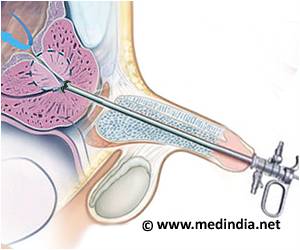For the first time, a new study has found that the endocrine-disrupting chemical bisphenol A (BPA) reprograms the developing prostate, making the gland more susceptible to precancerous lesions and other diseases later in a man's life.

"By using two novel models of human prostate development involving embryonic stem cells, this study is the first to show that low doses of BPA can actually reprogram human fetal prostate tissue in a manner that raises the risk of prostate diseases as men age," said the study's presenting author, Esther Calderon-Gierszal, a PhD student at the University of Illinois at Chicago, Chicago, IL.
BPA is a chemical used to manufacture certain plastics and is often found in water bottles, food storage containers and other consumer products. BPA disrupts the normal functioning of the body's hormones by mimicking the hormone estrogen.
Past studies of adult prostate stem cells and animal models found that BPA exposure increased the risk of developing prostate cancer, so researchers at the University of Chicago at Illinois set out to examine the effect in human embryonic prostate cells. The study was the first to generate a human fetal prostate model grown in a dish in a laboratory. In addition, researchers developed a human-like model in a mouse to study the effects of BPA on the developing prostate.
When the human fetal prostate model grown in the laboratory was exposure to low doses of BPA, investigators reported that exposure altered fetal prostate formation and increased the number of stem cells in the adult prostate, which could lead to aberrant growth and disease with aging. This type of cell activity eventually could lead to the development of prostate cancer.
To observe the effects of BPA in prostate tissue grown in a host mouse, researchers combined human embryonic stem cells and rat cells called mesenchyme. The researchers then grafted the combined tissue on to the kidneys of mice where it developed into human-like prostate tissue. The experiment modeled human BPA exposure feeding the mice low-dose BPA which led to the development of lesions in the human prostate tissue, including a precancerous lesion known as prostate intraepithelial neoplasia, or PIN.
Advertisement
Source-Eurekalert






![Prostate Specific Antigen [PSA] Prostate Specific Antigen [PSA]](https://www.medindia.net/images/common/patientinfo/120_100/prostate-specific-antigen.jpg)





